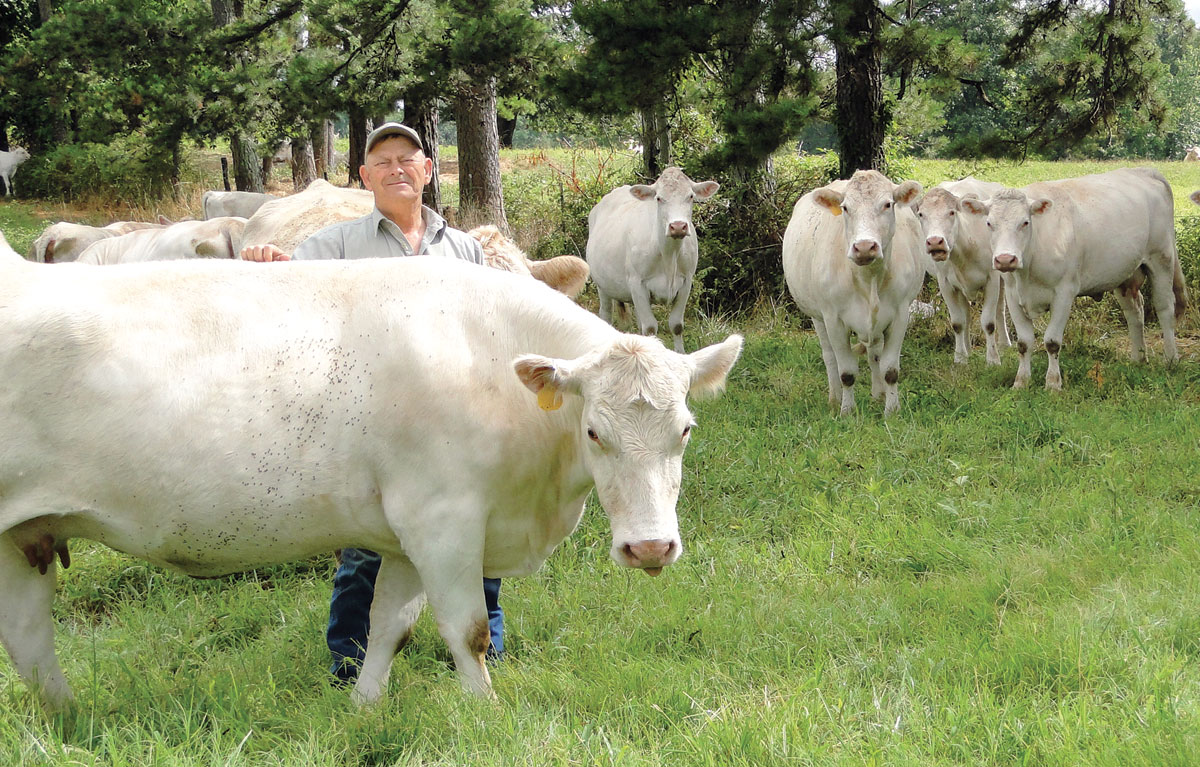
David Martin’s purebred Gelbvieh business, the Martin Cattle Company, has only been in operation on the family ranch in Judsonia, Ark., since 1991.
But David has been in the cattle business longer than that. His family has been in the business even longer, and they’ve been on that patch of land in Judsonia even longer.
The 1850s, in fact, is when David’s ancestors first settled on property that’s still part of the north central Arkansas ranch. The genial David told Ozarks Farm & Neighbor his father and grandfather started a purebred Hereford operation in 1936. When David is called away by other duties – he works for Purina Animal Nutrition, and serves on the board of the American Gelbvieh Association – the herd is tended by his wife, Rita, and by their three daughters and their husbands, all of whom live nearby.
David has 80 head of momma cows on 200 acres, some of it leased. “It’s small from the standpoint of a cattle operation,” he said. “It’s probably a little bit bigger than the average commercial cow herd. We all have jobs off the farm, and it’s strictly a family operations – daughters, sons-in-law, my wife – we take care of everything here.”
After graduating from Arkansas State, David managed the school’s farm and its cattle herd for a while, then ran a large purebred Santa Gertrudis ranch. It was there that he gained experience with Gelbvieh cattle, using the breed’s bulls on some of the ranch’s 1,500 head. When the ranch dispersed its cattle in 1990, David took some of the crossbred females back with him to Judsonia.
“We’ve had experience with a lot of different breeds of cattle,” he said, “The Gelbvieh/Balancer cattle really excelled here for us.”
He also explained that a Balancer is a Gelbvieh/Angus cross.
“We have a big demand for those bulls, because they can go into crossbreeding systems and work really well. The Angus adds some carcass value to them; the Gelbvieh adds some growth, and maternal ability to them, also.”
When OFN caught up with David, he had just returned from an AGA board meeting in Denver.
“We look out for the interests of the members, make sure everything is going well and keep the breed going forward and in the forefront of the beef industry,” he explained. The association is staying up on issues like genetic testing and the FDA’s new Veterinary Feed Directive, which will require prescriptions from veterinarian for feed additives. This also affects his job with Purina, but David didn’t expect it to be a hardship for most producers.
“It’ll be a workable situation for most people,” he said.
On a trip to the pasture, David and his guest from Ozark Farm & Neighbor were accompanied by David’s middle daughter, Dana Stewart, and her son Henry and two daughters. Henry was decked out in a cowboy outfit.
“All day, every day,” Dana laughed when explaining her son’s attire.
Henry bounced around as David conducted a tour of the herd. David produces calves in both the fall and spring, so he can offer bulls of different ages to his customers.
“Our bulls sell very rapidly,” he said. “At a year old to 14 months, they’re going to be gone. We don’t do as much advertising, because we have that demand for our bulls – a lot of repeat customers.”
He sells bulls primarily in Arkansas and Mississippi, but also services other surrounding states.
He’s staying on top of genetics, which he said is changing all the time. “With DNA testing and genomics now, you can test some of these young bulls and get a much more accurate picture of their DNA before you ever start using those bulls,” David said. His customers place the highest priority on calving ease, something he said Gelbvieh cattle excel at.
The pasture features a farm tire serving as a waterer; it’s surrounded by four posts. These will eventually anchor electric fencing that will allow David to rotationally graze. He’s had a mile of water line installed that conducts rural city water throughout the place, “which was a big chore,” he laughed, “as much rock as we’ve got to get through.”
He’s not planning to increase the herd, saying, “Most people have the idea that you can increase your cows by rotational grazing, but they can’t; you just efficiently use your grass better.”
Gelbviehs, he said, were originally red, but some were bred black for American tastes.
David AIs females, then follows with a clean up bull.
They use AI on the herd once, and then use the clean up bull. The field was lush, but weedy; he confessed, “I’ve been so busy this year, and my weed control’s not been there,” but said the cows do well on it. He raises about half of the hay he needs, and buys the rest.
Neighboring ranches are doing pretty well. David said, “The prices of cattle are better than they’ve been in many a year; a lot of people say, ‘Well, you’re getting rich in the cattle business now,’ and my response is, ‘No, we’re just able to pay the bills now.’”
On the future of the ranch David said, “We sure hope they have the interest in it to keep it going in the future. That’s our plan, or my plan.”
But he has no short term plans to stop ranching, saying, “It’s in the family; in the blood, you know, and it’s something that you want to keep doing. When it gets into your system like that, you will never get it out.”







